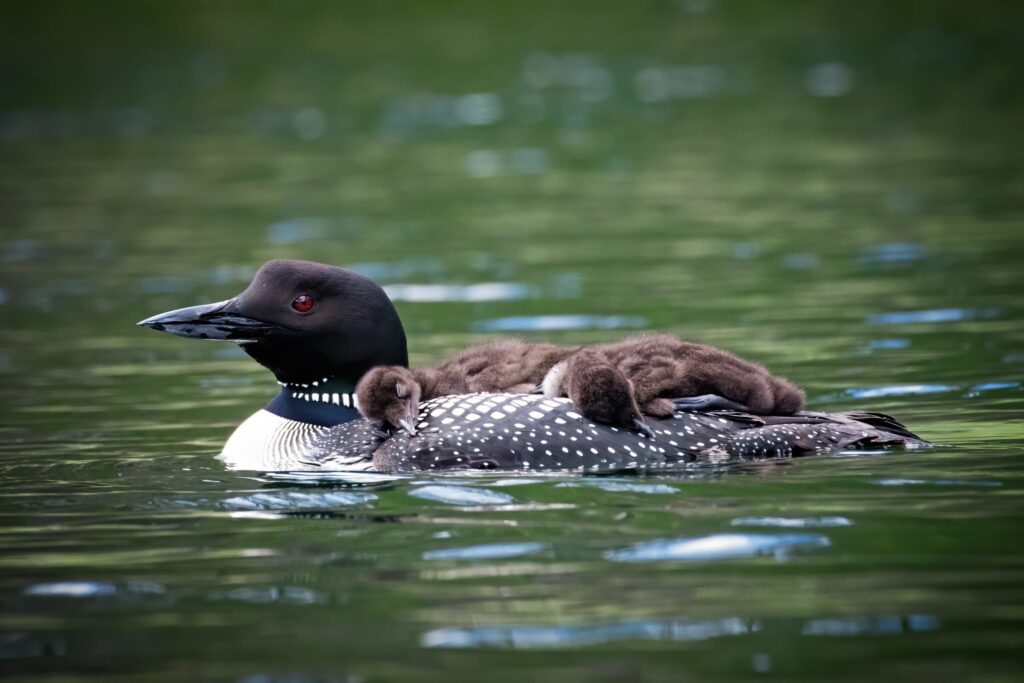Among many wonderful submissions to Innovia Foundation’s 2021 Second Annual Photo Contest Reimagining Our Communities, this endearing photograph captured the awe and admiration of our review committee and staff members and was awarded first-place overall. While the parent loon’s doting service to the adorable chicks slumbering upon its back tells a heartwarming story, the extraordinary chance of capturing this image and the increasingly scarce presence of loons in our region reveal deeper inspiration and exigence to this story.
A full-time nurse at Washington State University College of Nursing and part-time photographer, Joanie Christian’s passion for photographing wildlife was ignited 20 years ago by her lifelong love of nature. Joanie seeks to go a step beyond photography: “I’ve come to realize it’s about more than just getting a good photo; it’s also important to educate people about what I’m photographing. The more they know, the more they care.” She hopes we can each be more mindful of the wildlife around us, pausing to observe and appreciate their magnificence and beauty. Her research and photography have led her to publish various articles in regional publications including The Spokesman-Review and the North Columbia Monthly, and she hopes to soon publish a regional nature book series.
Joanie’s knowledge of and dedication to photographing loons illuminate the uniqueness of this photo. With approximately 20 nesting pairs of loons returning to Washington state each year, we are immensely fortunate that about 16 of those pairs nest in lakes in Eastern Washington. Loon chicks must swim and keep up with their parents almost immediately after hatching, though they tire and grow cold quickly; this prompts them to climb onto their parents’ backs or to nestle under their wings to rest and warm up. They ride on their parents’ back for up to 21 days after hatching. As you might expect of any young being, loon chicks do not keep still for very long, and this photograph was one of over 1,000 shots taken from this encounter. Another extraordinary condition is that Joanie captured this image from a kayak. She and her husband are avid kayakers, exploring the many beautiful lakes in the region, where there are amazing recreational and photographic opportunities of the gorgeous scenery and abundant wildlife.
Though many people may not know much about loons, the special role they play in our ecosystem requires our attention. Joanie emphasizes that loons are considered an indicator species, meaning if a change in the environment or water ecology negatively affects the loons, “we need to pay attention, because it will affect us, too.” An alarming example is the lake in Ferry County where these loons were photographed: algal blooms threaten the native fish species and the water temperature has risen, evidencing that this lake may not be able to support this species in the near future. No longer nesting in California, Oregon or Idaho, Washington state loons are on the southern fringe of the nesting population, which extends into British Columbia, Canada. Joanie hopes awareness of the threats to this species will encourage us “to protect these magnificent birds, so that we can continue to enjoy them for generations to come.”
Joanie Christian was awarded a $1,600 grant for her first-place winning photographs for nonprofit organizations of her choice. Demonstrating her passion for loons and commitment to protecting our region’s wildlife, this grant money will support research, fire mitigation and conservation efforts of the Friends of the Little Pend Oreille Wildlife Refuge, Birds of Prey Northwest, The Biodiversity Research Institute and Fire District #9 for the Little Pend Oreille Lakes Chain. Innovia Foundation is enthusiastic to support organizations that protect and improve what makes our region special, for we believe in securing vibrant and sustainable communities for all – feathered, or not.

